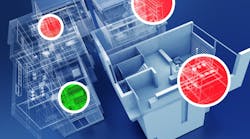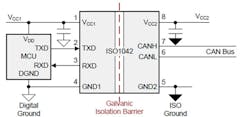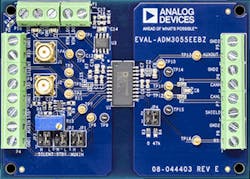Isolated CAN FD Transceivers Battle for Spot on the BOM
The Controller Area Network with Flexible Data-Rate standard (ISO 11898-2)—usually called out as CAN FD—extends the original CAN bus protocol specified in ISO 11898-1, and provides data throughput of about six times higher than its predecessor.1 Although one of the primary drivers for CAN FD was the automotive market, the standard is also seeing use in defense, industrial automation, smart buildings, autonomous devices, underwater vehicles, medical equipment. energy systems, and mil/aero networks. Due to the attractiveness of CAN FD, vendors are releasing new products, adding galvanic isolation to meet the needs of these non-automotive application areas.
TI’s Transceivers
Texas Instruments has introduced two isolated transceivers that combine what the company maintains is the industry’s highest bus-fault protection, highest common-mode transient immunity (CMTI), and lowest electromagnetic emissions into a 35% smaller package than previous devices. With a working voltage of 1,000 VRMS and withstand voltage of 5,000 VRMS, the ISO1042 and automotive-rated ISO1042-Q1 transceivers target industrial applications such as grid infrastructure, motor drives, and building automation, as well as hybrid electric vehicles and electric vehicles (HEVs/EVs) (Fig. 1).
1. The Texas Instruments ISO1042 CAN FD transceivers provide a high level of galvanic isolation and fault protection in a smaller package than previous devices in this class.
Device protection ratings include bus-fault protection of ±70 V, which provides a 20% higher short-to-dc margin. As a result, the ISO1042 and ISO1042-Q1 can protect 12-, 24- and even 48-V battery or power-supply systems during high-voltage shorts. With respect to EMI immunity and EMC emission, these transceivers feature a CMTI of 85 kV/ μs (minimum) with ESD protection of ±8 kV (using the International Electrotechnical Commission testing standard) and extremely low emissions, meeting the IEC TS62228 automotive-industry standard. As for speed, these transceivers support CAN FD speeds up to 5 Mb/s with a loop delay of 215 ns (maximum).
Basic and reinforced options of each device are available as either a 10.3- × 7.5-mm, 16-pin device or a 5.8- × 7.5-mm, 8-pin device, both in small-outline integrated-circuit (SOIC) packages. Pricing starts at $1.69 in 1,000-unit quantities for industrial versions and $1.99 (1,000 pieces) for automotive versions. For support, ISO1042DWEVM and ISO1042DWVEVM evaluation modules are available for $49.00 each.
ADI’s Transceiver Family
Texas Instruments isn’t alone in introducing new CAN FD products. Analog Devices extended its existing CAN transceiver product line with the galvanically isolated ADM3055E family using its iCoupler technology. These devices greatly exceed the standard’s requirement of 5 Mb/s by offering 12-Mb/s performance, thus anticipating future data-rate increases while maintaining full backward compatibility with existing CAN and CAN FD designs (“future proofing”). The reinforced ADM3055E adds a new, low-emissions isoPower isolated dc-dc converter, eliminating the need for a separate isolated supply.
The ADM3055E features low loop delay of 150 ns (maximum). It meets EN 55022/CISPR 22 Class B emissions standards on a two-layer PCB, has an IEC61000-4-2 Level 4 ESD rating (±8 kV contact/±15 kV air), and boasts high common-mode transient immunity of >75 kV/μs; other fault-protection includes ±40-V bus-fault protection on CAN bus pins and ±25-V common-mode range. The device features 5-V logic-side VCC with isolated-side VIO options for 1.8-, 2.5-, 3.3-, and 5.0-V supplies.
2. This Analog Devices evaluation board for ADM3055 CAN FD transceivers simplifies setup, test, and exercise of the devices.
Creepage and clearance—critical to meeting various regulatory mandates—is 8.3 mm with this 20-lead SOIC IC , which is priced at $5.95 (1000 pieces). The ADM3055E, with an industrial-temperature range of −40 to +105°C, is available now; versions with lower isolation ratings will be available soon. To speed design-in, the EVAL-ADM3055EEBZ evaluation board supports assessment of the input and output functions without the need for external components (Fig. 2).
Reference
1. CAN in Automation (CiA),”CAN FD - The basic idea”



